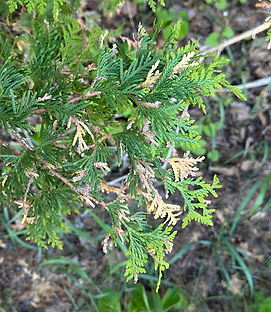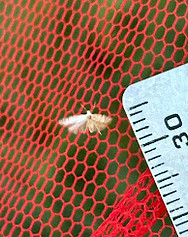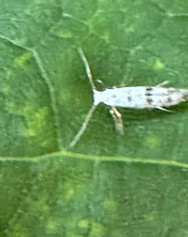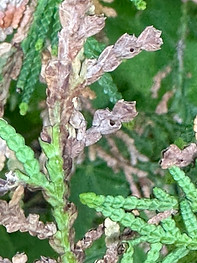Cedar Leaf Miner In - You Guessed It - Cedar
Do the tips of your your cedar leaves look dead? Does your Cedar look like the picture to the Left? If it does there is a good chance you have a small insect pest called Cedar Leaf Miner. Its a tiny moth sbout 3 to 5 millimetres long and its larvae are eating the insides of the leaves through late summer and into the fall and they end up killing the tips. They over winter in the leaves, finish eating in early spring, pupate on the leaves and emerge in early June. You can look for their exit holes in the dead tips to confirm that is the problem (the holes are small so look hard. see photo at side) The adults are active for about a Month from Early/mid June to Mid July (they do not eat). They then lay eggs on late July and the larvae burrow into the leaves and repeat the process.
Cedar Leaf Miner very rarely is an issue on strong healthy Cedar. They tend to attack weaker trees that have never done well often due to exposure to dessicating winds or very dry summers. These are trees low in secondary metabolites. Repeated or heavy infestation can put the cedars into decline. It is rare that the Miners kill the tree outright but they can make the Cedars look so thin, most people may want them removed.
Cedar Leaf Miner larvae responds well to systemic insecticides such as Dimethoate that can be applied by an Arborist. Homeowners can apply Safers Soap every 7 days during the adult phase and should have pretty good success knocking them back. However, If the trees are stressed, and/or your neighbours have the same infection, its likely that the Miner will be back again next year.
Note 1. Cedars are also susceptible to a leaf fungus called Cedar Leaf Blight that can sometimes be confused with the Miner.
Note 2. The adult moths live in the tree from late June to early July. If you shake a cedar branch the moths will fly out just for a second and immediately fly right back into the branches

Cedar leaf miner causes the tips of cedars leaves to die due to Larvae burrowing in the leaf

These are small moths . 3 to 5 mm

An adult moth magnified 3X

Look for tiny exit holes (see arrows) from where the larvae exit to pupate